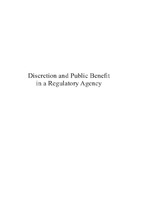Discretion and Public Benefit in a Regulatory Agency
Abstract
This book explores the manner in which a variety of public benefits such as environmental protection and consumer safety have been accommodated through the authorisation process within competition law and policy in Australia. While the regulator’s use of its discretion can be explained as a triumph of practice over theory, this book explores the potential for competition principles to be imbued by the wider discourses of democratic participation and human rights. In doing so it makes a significant contribution to the Australian competition policy as well as reconceptualising the way in which discretion is used by regulators. … a very important and creative contribution to the literatures on both business regulation in general and Australian competition and consumer protection law in particular. It pays special attention to an everyday regulatory function that is often ignored in scholarship. And it is very important in challenging—on both empirical and normative policy oriented grounds—a narrowly economic approach to competition law, and proposing an alternative understanding and practice for the public benefit test in ACCC authorisations.
Professor Christine Parker
The data Vij Nagarajan has analysed is quite unique in its focus. It is a kind of data and analysis that has not been completed before in the international literature. It is well written, theoretically sophisticated and incisive in its policy analysis.
John Braithwaite
Keywords
competition policy; australian law; Consumer protection; Human rights; Public-benefit corporation; WelfareDOI
10.26530/OAPEN_459947ISBN
9781922144355OCN
1030815683Publisher
ANU PressPublisher website
https://press.anu.edu.au/Publication date and place
Canberra, 2013Classification
Civil service and public sector


 Download
Download Web Shop
Web Shop